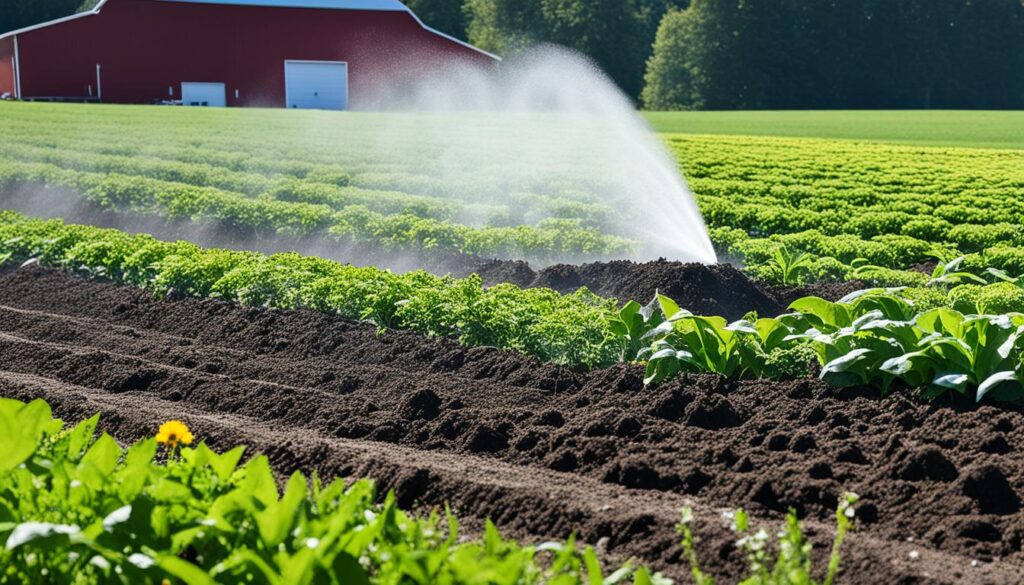Healthy soil is the foundation for sustainable agriculture, and microbial soil enrichment plays a crucial role in maintaining this vital resource. One of the most accessible and effective methods for enhancing soil health is through the use of horse manure, a natural and abundant byproduct.
This article explores the techniques and benefits of leveraging horse manure to enrich soil with beneficial microorganisms, ultimately improving nutrient cycling, plant growth, and the overall resilience of agricultural ecosystems.
Key Takeaways
- Microbial soil enrichment using horse manure can significantly improve soil health and fertility.
- Horse manure is a rich source of nutrients and organic matter that supports the growth of beneficial soil microbes.
- Composting and applying horse manure to soil can reduce the need for chemical fertilizers and promote sustainable agriculture practices.
- Nitrogen-rich fertilizers derived from horse manure can enhance plant growth and yield.
- Integrating microbial inoculants and understanding the role of soil microbiology are crucial for successful microbial soil enrichment.
Introduction to Microbial Soil Enrichment
Maintaining a healthy and thriving soil ecosystem is crucial for sustainable agriculture. At the heart of this lies soil microbiology, a fascinating world of microorganisms that play a vital role in nutrient cycling, plant growth, and overall soil health.
Microbial soil enrichment is an approach that harnesses the power of these microscopic allies to create a more productive and resilient agricultural landscape.
Understanding the Importance of Soil Health
Soil health is a multifaceted concept that encompasses the physical, chemical, and biological properties of the soil. A healthy soil is teeming with diverse microbial communities, including bacteria, fungi, and other beneficial organisms.
These microbes work tirelessly to break down organic matter, release essential nutrients, and improve the soil structure, making it more hospitable for plant growth.
Benefits of Microbial Soil Enrichment
By implementing microbial soil enrichment techniques, farmers and gardeners can tap into the remarkable potential of these unseen soil inhabitants. Some of the key benefits of this approach include:
- Improved nutrient cycling and availability for plants
- Enhanced soil structure and water-holding capacity
- Increased resistance to pests and diseases
- Reduced dependence on chemical fertilizers
- Promotion of sustainable agriculture practices
By harnessing the power of soil microbiology, growers can cultivate healthier, more productive soils that support vibrant plant growth and a more sustainable agricultural ecosystem.
Horse Manure: A Natural and Abundant Resource
When it comes to microbial soil enrichment, horse manure stands out as a remarkable natural resource. Equine manure composting offers a sustainable solution for enhancing soil health and fertility, making it a valuable tool for sustainable agriculture practices.
The composition of horse manure is particularly well-suited for providing organic matter, essential nutrients, and a thriving population of beneficial microorganisms to the soil. This nutrient-rich material can be effectively transformed into organic soil amendments that nourish the soil and promote the growth of healthy, vibrant plants.
Compared to other livestock manures, horse manure is generally lower in nitrogen-rich fertilizers, making it a more balanced source of nutrients.
This balanced composition ensures that the soil receives a well-rounded supply of essential elements, supporting the overall health and resilience of the ecosystem.
| Nutrient | Percentage in Horse Manure |
|---|---|
| Nitrogen (N) | 0.5-0.7% |
| Phosphorus (P) | 0.3-0.6% |
| Potassium (K) | 0.3-0.6% |
The abundance of horse manure, particularly in areas with active equine populations, makes it a readily available and cost-effective resource for equine manure composting and microbial soil enrichment.
By harnessing this natural asset, farmers and gardeners can unlock the full potential of their soil, promoting sustainable agriculture practices and enhancing the overall health of their land.
Microbial Soil Enrichment Techniques Using Horse Manure
Harnessing the power of horse manure can be a highly effective way to enrich your soil and promote a thriving microbial ecosystem.
By employing composting methods, you can transform this abundant natural resource into a nutrient-dense organic soil amendment that can work wonders for your garden or farmland.
Composting Horse Manure
The composting process is a crucial step in transforming raw horse manure into a valuable soil additive. Through careful management of the composting conditions, you can facilitate the breakdown of organic matter and the proliferation of beneficial microbes.
This not only reduces the volume of the manure but also produces a nutrient-rich compost that can be applied to your soil.
- Aerobic composting: This method involves actively turning and aerating the manure pile, allowing oxygen to circulate and promote the growth of aerobic microbes.
- Anaerobic composting: In this approach, the manure is left to decompose in a closed, oxygen-limited environment, fostering the growth of anaerobic bacteria that can also break down organic matter.
Both methods have their advantages, and the choice often depends on the scale of your operation and personal preferences. Regardless of the approach, the resulting compost can be a valuable addition to your soil, improving its structure, nutrient content, and overall health.
Applying Composted Manure to Soil
Incorporating the composted horse manure into your soil is a straightforward yet impactful step in the microbial soil enrichment process.
The nutrient-rich compost can help replenish the organic matter in your soil, supporting a diverse and thriving microbial community. This, in turn, can enhance nutrient cycling, improve soil structure, and promote the overall health and resilience of your plants.
By harnessing the power of horse manure through composting and application, you can take a significant step towards sustainable, organic soil management that nourishes your land and supports a thriving ecosystem.
Sustainable Agriculture Practices
As we delve into the world of microbial soil enrichment using horse manure, it’s essential to explore how these practices align with the principles of sustainable agriculture. Reducing our reliance on chemical fertilizers and embracing organic soil amendments can have a profound impact on the long-term health and fertility of our soils.
Reducing Chemical Fertilizer Dependence
Conventional agriculture has often relied heavily on synthetic, chemical-based fertilizers to boost plant growth and yield. However, this approach can disrupt the natural balance of the soil ecosystem, leading to environmental concerns and diminishing long-term soil health.
By incorporating sustainable agriculture practices that utilize nitrogen-rich fertilizers derived from organic soil amendments like horse manure, we can actively reduce our dependence on these chemical inputs and promote nutrient cycling within the soil.
- Reduced chemical footprint and environmental impact
- Improved soil structure and water-holding capacity
- Enhanced microbial diversity and soil fertility
- Increased plant resilience and nutrient uptake

By embracing sustainable agriculture practices that leverage the power of organic soil amendments like horse manure, we can cultivate healthier, more resilient soils that support thriving ecosystems and bountiful crop yields, all while minimizing our reliance on chemical fertilizers.
Organic Soil Amendments and Nutrient Cycling
Sustainable agriculture practices rely heavily on the concept of nutrient cycling, where organic matter and nutrients are continuously recycled within the soil ecosystem. One of the key components in this process is the use of organic soil amendments, such as composted horse manure.
Composted horse manure is a rich source of organic matter that can significantly improve soil structure, water-holding capacity, and the overall health of the soil.
As these organic amendments break down, they release essential nutrients that are readily available for plant uptake, supporting their growth and development.
| Benefits of Organic Soil Amendments | Impact on Soil Health |
|---|---|
| Improved soil structure | Enhanced water-holding capacity |
| Increased nutrient availability | Promotion of beneficial soil microorganisms |
| Enhanced water infiltration | Increased organic matter content |
By incorporating organic soil amendments like composted horse manure into the soil, farmers and gardeners can support the natural nutrient cycling process, reducing their reliance on synthetic fertilizers and promoting sustainable agriculture practices. This not only improves soil health but also contributes to the overall resilience and productivity of the land.
Nitrogen-Rich Fertilizers from Horse Manure
Harnessing the power of nitrogen-rich fertilizers derived from horse manure can be a game-changer for sustainable agriculture. Horse manure is a readily available and renewable resource that can be transformed into a potent soil amendment, providing essential nutrients for optimal plant growth and yield.
Enhancing Plant Growth and Yield
The nutrient-dense composition of horse manure, rich in nitrogen, phosphorus, and potassium, makes it an excellent organic soil amendment.
When properly composted and applied to the soil, the nutrients in horse manure are slowly released, providing a steady supply of nourishment for plants throughout the growing season.
By incorporating horse manure-based nitrogen-rich fertilizers into their sustainable agriculture practices, farmers can reduce their reliance on synthetic fertilizers, which can have a negative impact on the environment.
This approach not only enhances plant growth and yield but also contributes to the overall nutrient cycling within the soil ecosystem.
| Nutrient | Concentration in Horse Manure |
|---|---|
| Nitrogen | 0.5-1.5% |
| Phosphorus | 0.2-0.6% |
| Potassium | 0.4-0.9% |
The table above highlights the nutrient-rich composition of horse manure, emphasizing its potential as a valuable organic soil amendment and nitrogen-rich fertilizer for sustainable agriculture.

By leveraging the natural benefits of horse manure, farmers can unlock the true potential of their soil, leading to healthier plants, higher yields, and a more sustainable agricultural system.
Microbial Inoculants and Soil Microbiology
Unlocking the potential of your soil goes beyond simply adding nutrient-rich amendments like horse manure. To truly optimize soil health and achieve sustainable agricultural practices, we must delve into the intricate world of microbial inoculants and soil microbiology.
Microbial inoculants are live, beneficial microorganisms that can be introduced into the soil to enhance the natural microbial community. These microscopic allies play a crucial role in nutrient cycling, soil structure, and overall soil health.
By understanding the complex relationships within the soil ecosystem, we can harness the power of these microbes to support sustainable agriculture practices.
Soil microbiology, the study of the diverse communities of bacteria, fungi, and other microorganisms that inhabit the soil, is the key to unlocking the secrets of healthy, thriving soils. These microbes are responsible for breaking down organic matter, releasing essential nutrients, and creating a hospitable environment for plant growth.
- Microbial inoculants can help restore the balance of beneficial microorganisms in the soil, leading to improved nutrient cycling and soil structure.
- Understanding the role of soil microbiology is crucial for developing sustainable agriculture practices that reduce the reliance on chemical fertilizers and promote the natural fertility of the land.
- Integrating microbial inoculants and a deeper understanding of soil microbiology can be a game-changer in enhancing soil health and supporting the long-term viability of your agricultural endeavors.
As you continue your journey towards sustainable agriculture, embrace the power of microbial inoculants and dive deeper into the captivating world of soil microbiology.
By harnessing the natural processes within the soil, you can unlock the true potential of your land and cultivate a thriving, resilient ecosystem for generations to come.
Equine Manure Composting Methods
When it comes to harnessing the power of horse manure for soil enrichment, the choice of composting method can make a significant difference in the quality and effectiveness of the final product.
Composting horse manure can be achieved through two primary approaches: aerobic and anaerobic composting.
Aerobic vs. Anaerobic Composting
Aerobic composting, which takes place in the presence of oxygen, typically results in a nutrient-rich compost that is well-suited for improving soil health and promoting microbial activity. This process encourages the growth of beneficial microorganisms that break down organic matter, releasing essential nutrients like nitrogen, phosphorus, and potassium.
The aerobic approach also helps to minimize odors and maintain a consistent temperature throughout the composting process.
In contrast, anaerobic composting, which occurs in the absence of oxygen, can produce a different type of compost that is high in methane and carbon dioxide. While this approach may be more efficient in terms of volume reduction, the resulting compost may not be as effective for soil enrichment and microbial enhancement.
It’s important to carefully consider the specific needs of your soil and gardening goals when choosing between these two composting methods.
FAQ
How can horse manure be used to enrich the soil with beneficial microbes?
Horse manure can be an excellent source for microbial soil enrichment. By composting the manure, you can create a nutrient-rich amendment that introduces a diverse range of microorganisms to the soil.
The composting process helps break down the organic matter and release the nutrients, making them more readily available for plants to absorb.
What are the benefits of microbial soil enrichment using horse manure?
Microbial soil enrichment using horse manure offers several benefits, including improved soil structure, enhanced nutrient cycling, increased water-holding capacity, and the promotion of a thriving soil ecosystem. The microorganisms in the compost can also help suppress plant diseases and pests, leading to healthier plant growth and higher yields.
How does horse manure compare to other organic soil amendments?
Horse manure is a readily available and cost-effective organic soil amendment. It is rich in nitrogen, phosphorus, and potassium, making it an excellent addition to the soil. Compared to other manures or compost, horse manure tends to have a higher nutrient content and can be particularly beneficial for improving soil fertility and supporting the growth of beneficial microbes.
What are the best composting methods for horse manure?
There are two main composting methods for horse manure: aerobic and anaerobic. Aerobic composting, which involves the presence of oxygen, typically results in a faster decomposition process and a more consistent end product.
Anaerobic composting, which occurs in the absence of oxygen, can be slower but can also produce a nutrient-rich compost. The choice of method depends on factors such as available space, time, and the specific goals for the final compost.
How can the use of horse manure compost help reduce the dependence on chemical fertilizers?
Incorporating horse manure compost into the soil can reduce the need for synthetic chemical fertilizers. The organic matter and nutrients present in the compost can provide a slow-release, long-term source of nutrition for plants, reducing the requirement for frequent applications of chemical fertilizers.
This aligns with sustainable agriculture practices and helps build a healthier, more resilient soil ecosystem.
What role do microbial inoculants play in the microbial soil enrichment process?
Microbial inoculants, which contain beneficial microorganisms, can further enhance the microbial soil enrichment process when used in conjunction with horse manure compost.
These inoculants introduce a concentrated dose of specific microbes that can help accelerate the decomposition of organic matter, improve nutrient cycling, and strengthen the overall soil microbiome.

